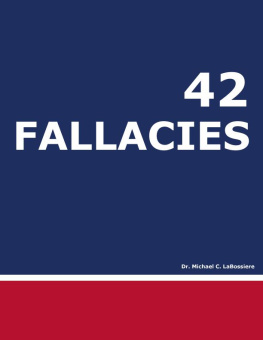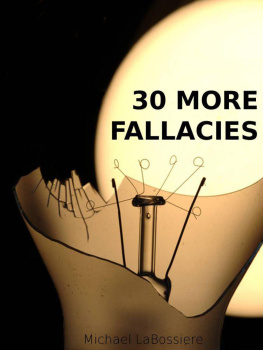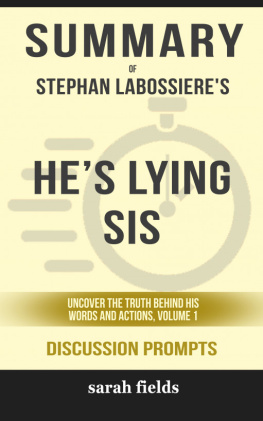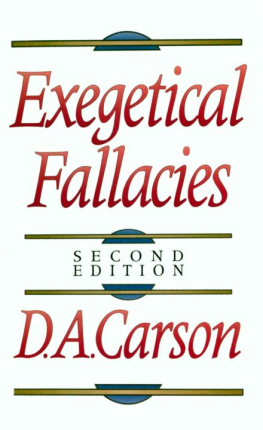Michael LaBossiere - 42 Fallacies
Here you can read online Michael LaBossiere - 42 Fallacies full text of the book (entire story) in english for free. Download pdf and epub, get meaning, cover and reviews about this ebook. year: 2010, genre: Politics. Description of the work, (preface) as well as reviews are available. Best literature library LitArk.com created for fans of good reading and offers a wide selection of genres:
Romance novel
Science fiction
Adventure
Detective
Science
History
Home and family
Prose
Art
Politics
Computer
Non-fiction
Religion
Business
Children
Humor
Choose a favorite category and find really read worthwhile books. Enjoy immersion in the world of imagination, feel the emotions of the characters or learn something new for yourself, make an fascinating discovery.
- Book:42 Fallacies
- Author:
- Genre:
- Year:2010
- Rating:4 / 5
- Favourites:Add to favourites
- Your mark:
- 80
- 1
- 2
- 3
- 4
- 5
42 Fallacies: summary, description and annotation
We offer to read an annotation, description, summary or preface (depends on what the author of the book "42 Fallacies" wrote himself). If you haven't found the necessary information about the book — write in the comments, we will try to find it.
42 Fallacies — read online for free the complete book (whole text) full work
Below is the text of the book, divided by pages. System saving the place of the last page read, allows you to conveniently read the book "42 Fallacies" online for free, without having to search again every time where you left off. Put a bookmark, and you can go to the page where you finished reading at any time.
Font size:
Interval:
Bookmark:
By Dr. Michael C. LaBossiere , ontologist@aol.com
Legal Information
This book is copyright 2002-2010 by Dr. Michael C. LaBossiere . It may be freely distributed for personal or educational use provided that it is not modified and no fee above the normal cost of distribution is charged for it.
In order to understand what a fallacy is , one must understand what an argument is. Very briefly an argument consists of one or more premises and one conclusion. A premise is a statement (a sentence that is either true or false) that is offered in support of the claim being made, which is the conclusion (which is also a sentence that is either true or false).
There are two main types of arguments: deductive and inductive. A deductive argument is an argument such that the premises provide (or appear to provide) complete support for the conclusion. An inductive argument is an argument such that the premises provide (or appear to provide) some degree of support (but less than complete support) for the conclusion. If the premises actually provide the required degree of support for the conclusion, then the argument is a good one. A good deductive argument is known as a valid argument and is such that if all its premises are true, then its conclusion must be true. If all the argument is valid and actually has all true premises, then it is known as a sound argument. If it is invalid or has one or more false premises, it will be unsound. A good inductive argument is known as a strong (or cogent) inductive argument. It is such that if the premises are true, the conclusion is likely to be true.
A fallacy is, very generally, an error in reasoning. This differs from a factual error, which is simply being wrong about the facts. To be more specific, a fallacy is an argument in which the premises given for the conclusion do not provide the needed degree of support. A deductive fallacy is a deductive argument that is invalid (it is such that it could have all true premises and still have a false conclusion). An inductive fallacy is less formal than a deductive fallacy. They are simply arguments which appear to be inductive arguments, but the premises do not provided enough support for the conclusion. In such cases, even if the premises were true, the conclusion would not be more likely to be true.
Example of a Deductive Argument
Premise 1: If Bill is a cat, then Bill is a mammal.
Premise 2: Bill is a cat.
Conclusion: Bill is a mammal.
Example of an Inductive Argument
Premise 1: Most American cats are domestic house cats.
Premise 2: Bill is an American cat.
Conclusion: Bill is domestic house cat.
Example of a Factual Error
Columbus is the capital of the United States .
Example of a Deductive Fallacy
Premise 1: If Portland is the capital of Maine , then it is in Maine .
Premise 2: Portland is in Maine .
Conclusion: Portland is the capital of Maine .
( Portland is in Maine , but Augusta is the capital. Portland is the largest city in Maine , though.)
Example of an Inductive Fallacy
Premise 1: Having just arrived in Ohio , I saw a white squirrel.
Conclusion: All Ohio squirrels are white.
(While there are many, many squirrels in Ohio , the white ones are very rare).
Also Known as: Ad Hominem Abusive, Personal Attack
Description:
Translated from Latin to English, ad Hominem means against the man or against the person.
An ad Hominem is a general category of fallacies in which a claim or argument is rejected on the basis of some irrelevant fact about the author of or the person presenting the claim or argument. Typically, this fallacy involves two steps. First, an attack against the character of person making the claim, her circumstances, or her actions is made (or the character, circumstances, or actions of the person reporting the claim). Second, this attack is taken to be evidence against the claim or argument the person in question is making (or presenting). This type of argument has the following form:
1. Person A makes claim X.
2. Person B makes an attack on person A.
3. Therefore As claim is false.
The reason why an ad Hominem (of any kind) is a fallacy is that the character, circumstances, or actions of a person do not (in most cases) have a bearing on the truth or falsity of the claim being made (or the quality of the argument being made).
Example#1:
Bill: I believe that abortion is morally wrong.
Dave: Of course you would say that, youre a priest.
Bill: What about the arguments I gave to support my position?
Dave: Those dont count. Like I said, youre a priest, so you have to say that abortion is wrong. Further, you are just a lackey to the Pope, so I cant believe what you say.
Example#2:
John: Sally was saying that people shouldnt hunt animals or kill them for food or clothing. She also
Wanda: Well, Sally is a sissy crybaby who loves animals way too much.
John: So?
Wanda: That means she is wrong about that animal stuff. Also, if we werent supposed to eat em, they wouldnt be made of meat.
Also Known as: You Too Fallacy
Description:
This fallacy is committed when it is concluded that a persons claim is false because 1) it is inconsistent with something else a person has said or 2) what a person says is inconsistent with her actions. This type of argument has the following form:
1. Person A makes claim X.
2. Person B asserts that As actions or past claims are inconsistent with the truth of claim X.
3. Therefore X is false.
The fact that a person makes inconsistent claims does not make any particular claim he makes false (although of any pair of inconsistent claims only one can be truebut both can be false). Also, the fact that a persons claims are not consistent with his actions might indicate that the person is a hypocrite but this does not prove his claims are false.
Example #1:
Bill: Smoking is very unhealthy and leads to all sorts of problems. So take my advice and never start.
Jill: Well, I certainly dont want to get cancer.
Bill: Im going to get a smoke. Want to join me Dave?
Jill: Well, I guess smoking cant be that bad. After all, Bill smokes.
Example #2:
Jill: I think the gun control bill shouldnt be supported because it wont be effective and will waste money.
Bill: Well, just last month you supported the bill. So I guess youre wrong now.
Example #3:
Peter: Based on the arguments I have presented, it is evident that it is morally wrong to use animals for food or clothing.
Bill: But you are wearing a leather jacket and you have a roast beef sandwich in your hand! How can you say that using animals for food and clothing is wrong!
Appeal to the Consequences of a BeliefDescription:
The Appeal to the Consequences of a Belief is a fallacy that comes in the following patterns:
#1: X is true because if people did not accept X as being true, then there would be negative consequences.
#2: X is false because if people did not accept X as being false, then there would be negative consequences.
#3: X is true because accepting that X is true has positive consequences.
#4: X is false because accepting that X is false has positive consequences.
#5: I wish that X were true, therefore X is true. This is known as Wishful Thinking.
#6: I wish that X were false, therefore X is false. This is known as Wishful Thinking.
This line of reasoning is fallacious because the consequences of a belief have no bearing on whether the belief is true or false. For example, if someone were to say If sixteen-headed purple unicorns dont exist, then I would be miserable, so they must exist, it would be clear that this would not be a good line of reasoning. It is important to note that the consequences in question are the consequences that stem from the belief. It is important to distinguish between a rational reason to believe (RRB) (evidence) and a prudential reason to believe (PRB) (motivation). A RRB is evidence that objectively and logically supports the claim. A PRB is a reason to accept the belief because of some external factor (such as fear, a threat, or a benefit or harm that may stem from the belief) that is relevant to what a person values but is not relevant to the truth or falsity of the claim.
Font size:
Interval:
Bookmark:
Similar books «42 Fallacies»
Look at similar books to 42 Fallacies. We have selected literature similar in name and meaning in the hope of providing readers with more options to find new, interesting, not yet read works.
Discussion, reviews of the book 42 Fallacies and just readers' own opinions. Leave your comments, write what you think about the work, its meaning or the main characters. Specify what exactly you liked and what you didn't like, and why you think so.










